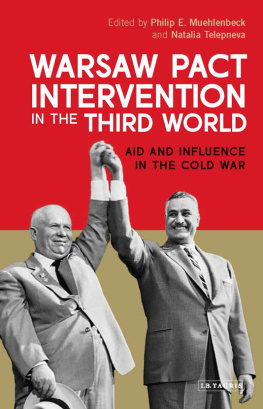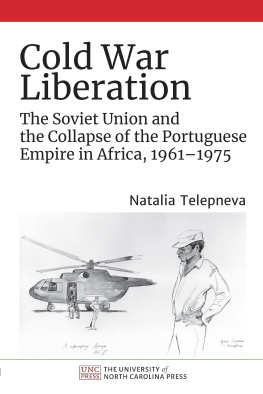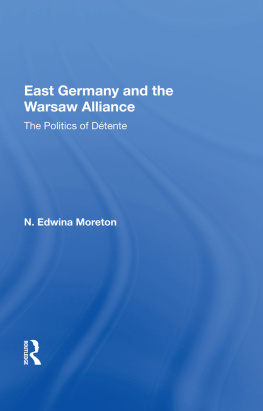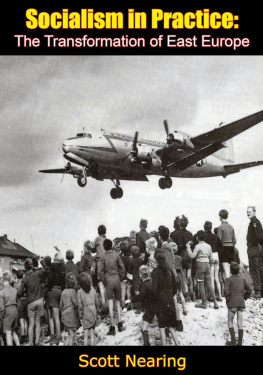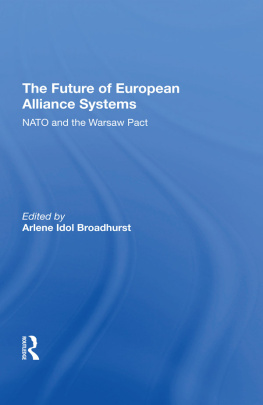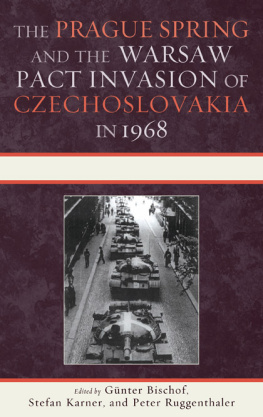
Philip E. Muehlenbeck is Professorial Lecturer in History at George Washington University and the author of Czechoslovakia in Africa, 19451968 (2015) and Betting on the Africans: John F. Kennedy's Courting of African Nationalist Leaders (2012). He is also the editor of Religion and theCold War: A Global Perspective (2012); Race, Ethnicity, and the Cold War: A Global Perspective (2012); and Gender, Sexuality, and the Cold War: A Global Perspective (2017).
Natalia Telepneva is a British Academy Postdoctoral Fellow at the University of Warwick, where she is working on Soviet ideas on development and modernization in Africa. Her research is focused on Soviet policy in Africa during the Cold War. She is currently preparing for publication a manuscript that investigates Warsaw Pact support for the anti-colonial movements in the Portuguese colonies and the internationalization of the Angolan Civil War in 19745.
This remarkable book is a good medicine for those who still believe that the Cold War was a zero-sum struggle with clear rules of subordination. In the Soviet bloc, the post-Stalin Thaw, Khrushchev's idealism and decolonization created entirely new horizons for the autonomy of Eastern Europe. The book's contributors conclude that for Warsaw Pact countries and individuals, the Third World became much more than an area of geopolitical struggle. In the 1950s to 1970s, it was the place where Soviet satellites became autonomous actors, pursuing their own political interests and profit. It was even more so for the thousands of people from Eastern Europe journalists and spies, doctors and teachers who worked and travelled in Africa, Asia and Latin America. They came as agents of communism yet encountered a fascinating variety of humanity and cultures, that ultimately challenged their views and identities. The book will be a valuable addition to courses on the Cold War and the international history of the twentieth century.
Vladislav Zubok, Professor of International History,
London School of Economics
From the moment Prague started selling arms to Nasser in 1956, the Soviet Union encouraged its satellites to become involved in the Third World. The degree to which they responded, and the nature of their response, depended on domestic considerations. That is the essence of the discussions addressed in this remarkable collection of essays, which brings an important new perspective to an understudied aspect of Soviet foreign policy. If Czechoslovakia and Bulgaria used the Third World to show their ideological purity, Poland, Romania, Hungary and the GDR had national interests to pursue.
Geoffrey Swain, Emeritus Professor, University of Glasgow

Published in 2018 by
I.B.Tauris & Co. Ltd
London New York
www.ibtauris.com
Copyright Editorial Selection 2018 Philip E. Muehlenbeck and Natalia Telepneva
Copyright Individual Chapters 2018 Jordan Baev, Csaba Bks, Iris Borowy, Lorena De Vita, Elena Dragomir, Przemysaw Gasztold, Jan Koura, Philip E. Muehlenbeck, George Roberts, Marek W. Rutkowski, Natalia Telepneva, Dniel Vkony, Robert Anthony Waters Jr and Larry L. Watts.
The right of Philip E. Muehlenbeck and Natalia Telepneva to be identified as the editors of this work has been asserted by them in accordance with the Copyright, Designs and Patents Act 1988.
All rights reserved. Except for brief quotations in a review, this book, or any part thereof, may not be reproduced, stored in or introduced into a retrieval system, or transmitted, in any form or by any means, electronic, mechanical, photocopying, recording or otherwise, without the prior written permission of the publisher.
References to websites were correct at the time of writing.
International Library of Twentieth Century History 101
ISBN: 978 1 78831 055 0
eISBN: 978 1 78672 417 5
ePDF: 978 1 78673 417 4
A full CIP record for this book is available from the British Library
A full CIP record is available from the Library of Congress
Library of Congress Catalog Card Number: available
CONTENTS
Philip E. Muehlenbeck and Natalia Telepneva
Lorena De Vita
Marek W. Rutkowski
Jan Koura and Robert Anthony Waters Jr
Larry L. Watts
Natalia Telepneva
George Roberts
Iris Borowy
Przemysaw Gasztold
Elena Dragomir
Philip E. Muehlenbeck
Csaba Bks and Dniel Vkony
Jordan Baev
Philip E. Muehlenbeck and Natalia Telepneva
LIST OF TABLES
Hungary's foreign trade with some Middle Eastern countries (million convertible Forints)
Hungary's overall foreign trade (million convertible Forints)
PREFACE
Since the end of the Cold War and the subsequent opening of government archives in Eastern and Central Europe, scholars have been able to obtain important documents from the other side of the Iron Curtain. These have reshaped our understanding of the foreign policies of Soviet bloc countries as well as the internal dynamics of the relationships between Moscow and its junior allies.
Yet, the level of coordination between the Soviet Union and its Warsaw Pact junior allies in the developing world, as well as the degree of autonomy that each Eastern European state had in pursuing its own policies independent of Moscow, is an understudied topic in Cold War studies. We embarked on this project with the presumption that the relative level of autonomy enjoyed by Moscow's junior allies had varied over time, location and between Eastern European capitals. Since it would be nearly impossible for a lone scholar to have the requisite linguistic abilities and funding to tackle this topic individually, we have assembled a group of historians working in the archives of each of the former Soviet bloc states in an attempt to answer these questions collectively.
This volume is not comprehensive, of course, nor could such a collection of essays ever hope to be so. Nonetheless, by broadening the study of the Cold War in the Third World to include closer examinations of the roles played by the junior members of the Warsaw Pact, this volume with its multidisciplinary approach and emphasis on multi-archival research (primary-source research for this project having been conducted in 12 different countries) aspires to serve as inspiration for further research on the role that Moscow's junior allies played in the Cold War in the Third World.
We would like to thank the following individuals for offering peer-review comments on prospective chapters for this volume: Peter Busch, Ben Cowan, Craig Daigle, Elena Dragomir, Kristen Ghodsee, William Glenn Gray, Corina Mavrodin, Katalin Miklossy, Lise Namikas, Eric Pullin, Przemysaw Gasztold, Massimiliano Trentin and Michal Zourek. Special thanks also go to Csaba Bks and Rob Waters for their valuable input on the Introduction. Finally, we would like to thank Tom Stottor, our acquisitions editor at I.B.Tauris, and Ian McDonald, our copy editor. This volume is a much better final product because of their involvement.
Notes
The term junior allies was first used in relation to the smaller states in the Warsaw Pact by Zbigniew K. Brzezinski in The Soviet Bloc: Unity and Conflict (Cambridge, MA, 1967).
Tony Smith, New Bottles for New Wine: A Pericentric Framework for the Study of the Cold War, Diplomatic History 24 (4) (2000), pp. 56791.
NOTES ON CONTRIBUTORS
Next page
